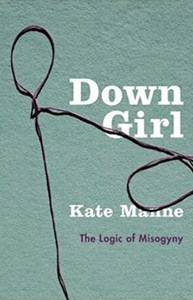Take a photo of a barcode or cover
Not in a place where I can read this.
challenging
informative
reflective
slow-paced
informative
sad
challenging
emotional
informative
reflective
medium-paced
I bought this book to read the fourth chapter, titled: ”Taking His (Out),” an examination of entitlement as a fundamental function of misogyny. As Martha Nussbaum wrote in the foreword, “misogyny is primarily about the demand that women give support, service, and care.” This book was rigorously written, but apart from the section addressing the specific issue I was interested in, the arguments were more meticulous (and current) than I needed.
dark
informative
reflective
slow-paced
Thoroughly enjoyed this.
I genuinely think the focus on white women is what dragged this down for me, even if I agreed with her reasoning for her focus and she did a good job touching on more intersectional points when it came up. She succeeded INSANELY well in what she was looking to write, the white-cisness and focus on 2016 election just wasn't exactly what I was expecting or wanting from the book. I think if the introduction made it more clear what the trajectory of the text was, I'd have enjoyed it more. But as it was it was very educational, well-written, and well-researched. It just lacked what I would need to give it a 5 star personally.
I like that Manne wrote a book to explain what misogyny is and how it operates. Misogyny is hostility toward women who fail to adhere to patriarchal norms, rather than hostility toward women simply because they are women. Under Manne's view, any person or entity can be misogynistic by policing women in this way; it's wrong to think of misogyny as an individual psychological failing on the part of the misogynist. (Reminds me of 2020's discussion of structural vs. personal racism.) Manne explains that misogyny is different from sexism: sexism is the justification for patriarchy (e.g., stereotypes about women's intelligence or preferences), while misogyny is patriarchy's enforcement mechanism. She also clarifies that misogyny does not require dehumanizing women. On the contrary, misogyny presupposes women's humanity, but it sees them not as human "beings" but as human "givers." Thus, men get mad when women don't fulfill their patriarchal role, viewing them as enemies or traitors. It is unlikely that men would get so resentful if they didn't see women as humans, in the technical sense.
Then, Manne fleshes out her argument by giving examples of how misogyny can be used as patriarchy's enforcement mechanism. Under patriarchy, women owe people feminine-coded goods and services like attention, affection, admiration, sympathy, sex, and children. By contrast, men are encouraged to seek masculine-coded perks and privileges like power, prestige, rank, reputation, honor, and money. Manne discusses three situations where misogyny serves to put women in their place: (1) women withholding goods that men believe they are entitled to (as in the case of society extending outsize sympathy to men accused or convicted of rape); (2) women asking for goods they are traditionally expected to give (as in the case of the backlash against women who come out as victims and seek moral attention); and (3) women try to take what is traditionally seen as men's for the taking (as in the case of public smears against female politicians pursuing higher office).
The problem is that all her points are absolutely BURIED in dense, incomprehensible academic writing. IT DOESN'T HAVE TO BE THIS WAY! I have read plenty of philosophy papers that were written in plain English. There is simply no excuse!
Then, Manne fleshes out her argument by giving examples of how misogyny can be used as patriarchy's enforcement mechanism. Under patriarchy, women owe people feminine-coded goods and services like attention, affection, admiration, sympathy, sex, and children. By contrast, men are encouraged to seek masculine-coded perks and privileges like power, prestige, rank, reputation, honor, and money. Manne discusses three situations where misogyny serves to put women in their place: (1) women withholding goods that men believe they are entitled to (as in the case of society extending outsize sympathy to men accused or convicted of rape); (2) women asking for goods they are traditionally expected to give (as in the case of the backlash against women who come out as victims and seek moral attention); and (3) women try to take what is traditionally seen as men's for the taking (as in the case of public smears against female politicians pursuing higher office).
The problem is that all her points are absolutely BURIED in dense, incomprehensible academic writing. IT DOESN'T HAVE TO BE THIS WAY! I have read plenty of philosophy papers that were written in plain English. There is simply no excuse!
informative
reflective
sad
medium-paced





